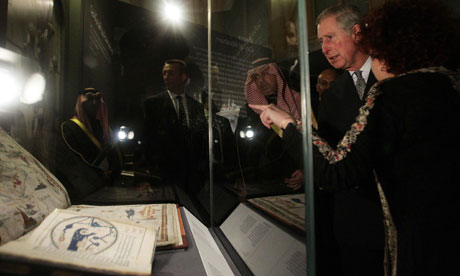The Hajj exhibition is in stark contrast to Saudi Arabia's cultural vandalism
The Saudi elite are proud of the British Museum's Hajj exhibition – it's a shame they don't feel the same about all their heritage
by Shenaz Kermali
The Guardian Online [London]
January 27, 2012
http://www.islamicpluralism.org/1974/the-hajj-exhibition-is-in-stark-contrast-to-saudi

The Prince of Wales looks at exhibits during a visit to the British Museum's Hajj exhibition with Saudi representatives. Photograph: Yui Mok/PA
The Saudi embassy and their friends in Riyadh must be pleased with the considerable public interest in the Hajj exhibition, which opened at the British Museum this week. Beautiful relics, including historical and contemporary art, textiles and manuscripts, bring to life the profound significance of the Hajj, the pilgrimage that has remained unchanged since the prophet Muhammad's time in the seventh century.
The Saudis are elusive about many things in their country, but clearly a cultural showcase on the journey to Mecca that every able Muslim must perform at least once in their lifetime, is not one of them. And where better for the Saudis to display their rich history – and tolerance of different cultures (the Hajj brings together over 180 nationalities together in a single space) – than in a national museum of a country whose press does not spare them.
But as I looked at the painstakingly gathered relics on display, and the beaming pride on the face of Saudi ambassador, Prince Mohammed bin Nawaf Al Saud, as he entered the exhibition, I could not help but remember reports of the demolishing of the prophet Muhammad's home and his wife Khadija in 1984 to make way for a public toilet. Where was the Saudi pride in their own heritage then?
The ambassador was not available for questions, so I asked his aide, Faisal al-Muaammer, an adviser to the Saudi king and the secretary general of the King Abdulaziz public library, which partnered with the British Museum on the Hajj exhibition, about the destruction of the prophet's house.
His answer was a jumbled combination of: "It is for the expansion of Mecca – it is not an option … but maintaining all our religious sites is a religious duty," and "we don't have enough information to know what you're talking about," and "from a historical perspective we don't know if this was the prophet's home or not" – before one of his aides changed the subject to how pilgrims are now being forced to pray in the streets because of the rise in people going for Hajj every year.
His response was unsurprising, given the fact that the Saudis have had to defend themselves against claims of cultural vandalism before, under the guise of religion and urban development. Ali al-Ahmad, the director of the Gulf Institute in Washington, tells me an estimated 95% of Mecca's millennium-old buildings have been demolished in the past 20 years alone.
But it's not the needs of modern city-dwellers causing this – but the opinion that historical sites and shrines encourage shirq, or idolatry, and must be destroyed. According to Dr Irfan al-Alawi, the chairman of the Islamic Heritage Research Foundation, which was set up to protect the holy sites, authorities are now discussing removing the symbolic green dome on the prophet Muhammad's mosque in Medina, which lies directly above the graves of the three caliphs who led Islam after the prophet Muhammad died.
For the Al-Saud monarchy, any physical traces of history, even those from pre-Islamic times, are a distraction from God and raise the spectre of bida, or innovation – an action invented by society or culture that has no legitimate attribution to the life of the prophet. (So for anyone to visit a marked location where the prophet sat or prayed, for example, would be an offence under bida.)
It's disconcerting to see just how much of Islam's holiest cities are being damaged, even in the eyes of its own people. Sami Angawi, a renowned architect from the Jeddah-based Hajj Research Centre, told Reuters last year: "Both [Mecca and Medina] are historically almost finished. You do not find anything except skyscrapers."
Saudi Arabia may be proud of some parts of their archeological heritage: the officials from King Abdulaziz public library reminded me of another cultural initiative making its way through Europe – Roads of Arabia, a travelling exhibition now on display at the Pergamon Museum in Berlin. All this seems like a wonderful way to introduce the beauty of your country to the world. But for me, and for so many other historians and Muslims living in the west, there's a stark contrast between exhibitions like this and actions at home. Which leaves me wondering: why are the Saudis only comfortable showcasing their cultural heritage in the west?
Related Topics: British Muslims, European Muslims, Saudi Arabia, Wahhabism, WahhabiWatch
receive the latest by email: subscribe to the free center for islamic pluralism mailing list



